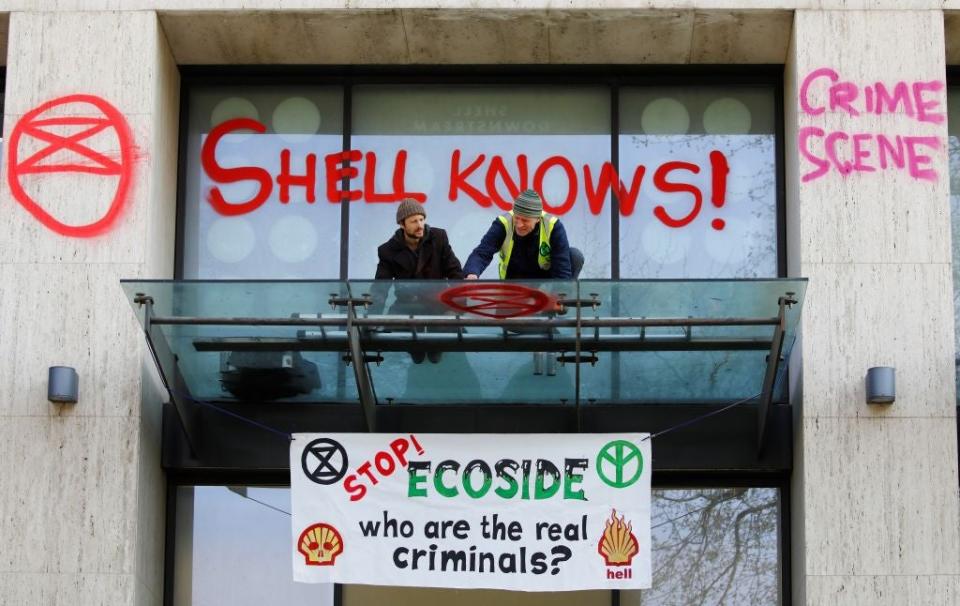Justice Amy Coney Barrett to hear climate lawsuit against Shell – despite accusations of conflict of interest

Justice Barrett is due to hear arguments in a case brought against the oil giant unless she recuses herself.
(Photo by Chip Somodevilla/Getty Images)Trump’s Supreme Court appointee, Justice Amy Coney Barrett, is set to hear legal arguments in a climate lawsuit against Shell next week amid conflict-of-interest accusations due to her father’s 30-year legal career at the oil giant.
A hearing is scheduled for Tuesday before the US’s highest court in the case brought by the city of Baltimore against Big Oil, including ExxonMobil, Shell and BP, demanding damages associated with sea-level rise and other effects of the climate crisis.
Justice Barrett’s father, Michael Coney, spent three decades as an attorney for Shell Oil between 1978 and 2007, where he oversaw legal issues for Shell’s offshore drilling arm.
While Mr Coney was at Shell, the oil giant’s own scientists published a 90-page, confidential internal memo (which was later leaked) that asserted "the main cause of increasing C02 concentrations is considered to be fossil-fuel burning".

The 1988 report includes details on the “direct operational consequences” of global heating on the company’s "offshore installations, coastal facilities and operations platforms, harbours, refineries, depots".
At time of publication, the case docket did not show that Justice Barrett had recused herself. The Supreme Court told The Independent in an email that justices generally do not comment on their recusal in particular cases.
When she was a lower-court judge, Justice Barrett recused herself from cases involving Shell Oil due to her father’s former senior legal role at the company.
“My father worked at Shell Oil Company for many years, and while on the Seventh Circuit, in an abundance of caution, I have recused myself from cases involving those Shell entities with which he was involved,” Justice Barret wrote in a questionnaire during her Senate confirmation hearings in October.
Mr Coney also held a top position at American Petroleum Institute (API), the fossil fuel industry’s powerful lobbying arm. API is backing the oil firms in the Baltimore case by filing an amicus brief, a move to allow a non-party to a case to offer information, expertise, or insight.
There is the possibility that Mr Coney could be deposed in the case, according to legal experts.
“Her dad’s role in maximising Shell’s net revenue from drilling grew even as Shell’s internal documents show it knew burning carbon was changing our climate and he even sought tax benefits from its efforts to adapt its drilling platforms to survive sea level rise and bigger storms resulting from climate change,” Lisa Graves, executive director of True North Research and a former chief counsel for nominations on the Senate Judiciary Committee, told Huffington Post.
Earlier this week, a group of science, environmental and legal advocacy organisations called on Justice Barrett to recuse herself.

Another Supreme Court judge, Justice Samuel Alito, already recused himself from the Baltimore case, according to filings, as he reportedly owns stock in oil and gas firms.
“We urge Justice Barrett to heed both precedent and common sense and join Justice Alito in recusing herself from this case brought against Big Oil,” said Kathy Mulvey, from the Union of Concerned Scientists.
“It’s well known that Justice Barrett’s father worked for decades as an attorney at Shell Oil, a named defendant in the case. He also played an active role in the American Petroleum Institute, the industry’s main US lobby group, which is funded by numerous defendants in the Baltimore suit and has submitted an amicus curiae brief in support of their petition to the Supreme Court.
"These deep and long-standing conflicts of interest have led Justice Barrett to recuse herself from cases regarding Shell in the past. Her obligation to judicial impartiality should lead her to do the same here. Baltimore residents deserve access to impartial justice for the climate harms they are suffering.”
In 2018, Baltimore became one of several US cities to try to hold oil giants financially responsible for the climate crisis, saying that companies pushed misinformation for decades, despite internal documents revealing their own scientists knew all too well the risks.
The Maryland city says it faces massive costs to protect its residents, businesses and infrastructure from the escalating impacts of climate change.
“For 50 years, these companies have known their products would cause rising seas and the other climate change-related problems facing Baltimore today,” Baltimore Solicitor Andre Davis said at the time.
“They could have warned us. They could have taken steps to minimise or avoid the damage. In fact, they had a responsibility to do both, but they didn’t, and that’s why we are taking them to court.”
The city battles extended heatwaves, particularly dangerous in so-called "urban heat islands", which are more likely to be in predominantly Black and poorer neighbourhoods. In these areas, doctors point to increased rates of chronic illnesses that are exacerbated by heat, especially lung diseases like asthma, emphysema or bronchitis.
By 2045, Baltimore, located in Chesapeake Bay, is expected to see a ten-fold increase in tidal floods each year – to more than 225 – because of sea-level rise alone (compared with today’s average).
Baltimore originally filed its climate suit in Baltimore Circuit Court, not federal court. But oil companies have gone to war to move cases, like the one from Baltimore, to the Supreme Court, believing they are more likely to have the upper hand there, E&E News said.
The city is now asking the Supreme Court to refer the suit, which seeks unspecified damages, back to state court.
During his term, President Donald Trump was able to tip the balance of the land’s highest court by appointing three conservative justices – Barrett, Neil Gorsuch and Brett Kavanaugh. But he also managed to get more than 200 judges onto the federal bench, reshaping the judiciary for a generation.
During nomination hearings in October, Justice Barrett insisted that she would bring no personal agenda to the Supreme Court, instead deciding cases “as they come”.
However, she refused to say that climate change is scientific fact, calling it instead “a very contentious matter of public debate”.
“I will not express a view on a matter of public policy, especially one that is politically controversial,” Judge Barrett said.
“You know, I”m certainly not a scientist,” she also stated. “I mean, I’ve read things about climate change. I would not say that I have firm views on it.”
Her words alarmed environmentalists and brought condemnation from scientists who have long-established the facts that human-caused CO2 emissions are heating the planet.
Activist Greta Thunberg tweeted: “To be fair, I don’t have any ‘views on climate change’ either. Just like I don’t have any ‘views’ on gravity, the fact that the earth is round, photosynthesis nor evolution.
“But understanding and knowing their existence really makes life in the 21st century so much easier.”
Brett Hartl, government affairs director at the Center for Biological Diversity, told The Independent: "It is a typical conservative, right-wing view that scientific reality is something that you can have an opinion about."
Read More
Government defends approval of UK’s first deep coal mine in 30 years
Oil companies lock in drilling, challenging Biden on climate
Enbridge rejects Michigan's demand to shut down oil pipeline

 Yahoo News
Yahoo News 